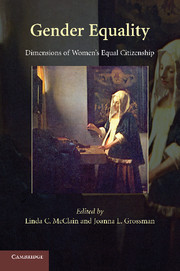Book contents
- Frontmatter
- Contents
- Contributors
- Acknowledgments
- Gender Equality
- Introduction
- PART I CONSTITUTIONAL CITIZENSHIP AND GENDER
- PART II POLITICAL CITIZENSHIP AND GENDER
- PART III SOCIAL CITIZENSHIP AND GENDER
- 10 Pregnancy and Social Citizenship
- 11 Equality: Still Illusive After All These Years
- 12 Razing the Citizen: Economic Inequality, Gender, and Marriage Tax Reform
- PART IV SEXUAL AND REPRODUCTIVE CITIZENSHIP
- PART V GLOBAL CITIZENSHIP AND GENDER
- Suggested Readings
- Index
- References
12 - Razing the Citizen: Economic Inequality, Gender, and Marriage Tax Reform
Published online by Cambridge University Press: 05 August 2012
- Frontmatter
- Contents
- Contributors
- Acknowledgments
- Gender Equality
- Introduction
- PART I CONSTITUTIONAL CITIZENSHIP AND GENDER
- PART II POLITICAL CITIZENSHIP AND GENDER
- PART III SOCIAL CITIZENSHIP AND GENDER
- 10 Pregnancy and Social Citizenship
- 11 Equality: Still Illusive After All These Years
- 12 Razing the Citizen: Economic Inequality, Gender, and Marriage Tax Reform
- PART IV SEXUAL AND REPRODUCTIVE CITIZENSHIP
- PART V GLOBAL CITIZENSHIP AND GENDER
- Suggested Readings
- Index
- References
Summary
Social citizenship ideals fall not only outside the bounds of fundamental constitutional rights, but also at the margins of plausible politics in the United States. Citizenship, in the prevailing view, confers the political and civil rights that ensure access to a democratic state and market. That view distinguishes rights to economic equality or socioeconomic security as peripheral, or even antagonistic, to the concerns of democratic government.
Indeed, over the last several decades, leading U.S. intellectuals and policy makers have designed and defended a citizenship vision linked to upward redistribution of economic resources. In this vision, economic inequality and widespread insecurity are necessary and natural to freedom and strength in state and market. Among mainstream leaders of law and politics, the response to this antisocial citizenship has been mostly acquiescence, obliviousness, or resignation, rather than sustained critical analysis or vigorous resistance.
This chapter links the failure of social citizenship ideals in the United States to a broader weakness in citizenship ideals – a weakness that is deeply related to gender ideology and practice. To better advance a vision of social citizenship, U.S. law and politics need a stronger vision, not just of economic equality, but of gender equality and of democracy in general. Feminist scholars have analyzed how ideas about gender help shape the common assumption that the costs of raising and sustaining capable, productive citizens are largely private family responsibilities. But ideas about gender also help to undermine egalitarian economic policy more generally.
- Type
- Chapter
- Information
- Gender EqualityDimensions of Women's Equal Citizenship, pp. 267 - 286Publisher: Cambridge University PressPrint publication year: 2009



